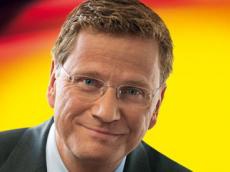|
|
TODAY.AZ / Politics
'Karabakh conflict obstacles prosperous development of entire region'
14 March 2012 [12:56] - TODAY.AZ

APA interviewed Foreign Minister of Germany Guido Westerwelle
Your visit is mostly dedicated to the 20th anniversary of the diplomatic relations set between two countries. What more do we need to do to strengthen German - Azerbaijani cooperation?
Guido Westerwelle: I am pleased with the high density of our bilateral relations. Germany has been a close partner of Azerbaijan in the past twenty years. With my visit I do not only want to pay tribute to 20 years of the diplomatic relations, but also signal our interest in deepening our cooperation further, both bilaterally and in the EU context. German companies, for example, stand ready to invest more and could help diversifying Azerbaijan’s economy further. Both Germany and Azerbaijan are members of the UN Security Council this year and I look forward to close coordination with Azerbaijan on topics such as Syria or Iran.
Germany has always supported Nabucco project, but until now Shah Deniz consortium hasn’t decided on the pipeline route, so what project Germany supports now, and how could Azerbaijan and Germany widen its energy cooperation?
Guido Westerwelle: The development of the Southern Corridor has always been of high strategic importance for the EU and for Germany. Any pipeline solution from Azerbaijan to the EU - be it Nabucco or the Trans-Adriatic Pipeline, need to be open to third parties. They need to allow the transport of more gas volumes from the Caspian region when they become available.
On your point of view, how Eurovision song contest to be held in Baku this year can contribute to the promotion of Azerbaijan in Germany?
Guido Westerwelle: Azerbaijan should use the Eurovision Song Contest as an opportunity to present itself as a country which wants to be open and to share Europe’s fundamental values such as individual freedom. I was happy to see Ell and Nikki win last year in Duesseldorf. Ell, by the way, was in Germany in 2008 on a scholarship of the German Academic Exchange Service and is fluent in German. In that sense he is an ambassador of your country in Germany.
How do you estimate the efficiency of Eastern Partnership program?
Guido Westerwelle: The Eastern Partnership offers a lot to partnership countries and has proven to be an effective tool to strengthen and foster the rapprochement between the EU and its Eastern neighbourhood. Today, less than three years after the Partnership’s launch, Association Agreements with Azerbaijan and four other Eastern Partnership members are being negotiated. Of course, we expect our partners to actively contribute as well: the governments, but also the civil societies. And it is perfectly clear that this partnership must be based on fundamental European values and standards all partners have committed themselves to.
The EU repeatedly stated about its intention to be more active in Nagorno-Karabakh conflict resolution, especially in terms of confidence building measures between the sides, how Germany can contribute to this issue?
Guido Westerwelle: Last year, Germany was instrumental in initiating a debate in Brussels on stronger EU engagement in this conflict. The conclusions of the EU Foreign Affairs Council last month and the new mandate of the EU Special Representative for the Southern Caucasus are a good basis for such enhanced engagement. This engagement aims at supporting and complementing the OSCE Minsk Group, for example in the field of confidence-building. It is high time to reach a solution to this conflict that stands in the way of a prosperous and peaceful development of the entire region.
/APA/
URL: http://www.today.az/news/politics/104083.html
 Print version
Print version
Views: 1344
Connect with us. Get latest news and updates.
See Also
- 25 November 2025 [14:14]
China invests in Azerbaijan: new investment direction - 25 November 2025 [12:23]
Milli Majlis to focus on visa agreements and core legal amendments - 25 November 2025 [12:12]
Did you want "Azerbaijan next"? Choke on it! - A reminder to the Armenian revanchists - 25 November 2025 [12:04]
President Ilham Aliyev sends congratulatory letter to Chairman of Presidency of Bosnia and Herzegovina - 25 November 2025 [09:00]
Trump: Something good may be happening on Ukraine - 25 November 2025 [08:37]
President Ilham Aliyev shares post on fifth anniversary of Kalbajar’s liberation - 24 November 2025 [18:21]
Nearly 200 anti-personnel mines found in Azerbaijan’s freed territories - 24 November 2025 [16:32]
Azerbaijani Parliament Speaker meets Slovak Ambassador - 24 November 2025 [15:13]
Azerbaijan congratulates Turkiye and Australia - 24 November 2025 [14:41]
ANCA recruits odious senators against Azerbaijan: Signatures for signatures' sake
Most Popular
 Azerbaijan brings together NGOs of Turkic States for first time
Azerbaijan brings together NGOs of Turkic States for first time
 President Erdogan plans to meet his Russian counterpart to discuss Ukraine
President Erdogan plans to meet his Russian counterpart to discuss Ukraine
 ANCA recruits odious senators against Azerbaijan: Signatures for signatures' sake
ANCA recruits odious senators against Azerbaijan: Signatures for signatures' sake
 Israeli strike hits Beirut, aiming at Hezbollah chief of staff
Israeli strike hits Beirut, aiming at Hezbollah chief of staff
 Baku, Tehran exchange views on mutual interests and regional issues
Baku, Tehran exchange views on mutual interests and regional issues
 US President claims he is underappreciated, says Ukraine lacks gratitude
US President claims he is underappreciated, says Ukraine lacks gratitude
 Ninety arrested at London rally backing banned Palestine Action group
Ninety arrested at London rally backing banned Palestine Action group
